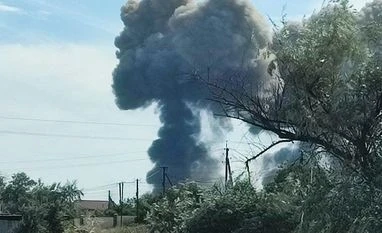On the sidelines of the armed conflict, Russia and Ukraine are also locked in a war of propaganda. And Kiev has a slight edge here, due to extensive support from the West.
But Russia is not lowering the guard. Last week, it wrote a letter to the UN Security Council. Its diplomat too asked for a closed door meeting with the council on Tuesday. But why? Moscow suspects that Kiev will use “dirty bomb” in its own territory to defame it.
What is a dirty bomb?
A dirty bomb contains conventional explosives like dynamite and radioactive materials such as uranium, which makes them cheaper and easier to transport when compared with nuclear weapons. When exploded, the material inside the bomb is scattered through the air. Although dangerous, it is not as destructive as a nuclear bomb.
Why is dirty bomb used?
The intention of the dirty bomb is to cause panic and fear among public rather than actual physical damage. Hence, it is also usually referred to as a "weapon of mass disruption" as opposed to a "weapon of mass destruction," which is the case for nuclear explosions.
Is the dirty bomb dangerous?
Dirty bomb is a psychological weapon. The scattered material after an explosion depends on many other factors such as wind at the time of blast. The radioactive spread, if inhaled near the blast, could be somewhat dangerous.
Previously, there is no record of successful dirty bomb explosion anywhere in the world. However, multiple attempts have failed.
Why is Russia talking about a dirty bomb?
Russia says Ukraine is planning to use a dirty bomb as a provocation tactic against Moscow and escalate the war. Russia has not offered any evidence to back the claims. The West, including NATO, European Union, have categorically denied such claims as false.
Ukrainian President Volodymyr Zelenskyy has again slammed Russia. His foreign minister has invited UN inspectors to visit Ukraine, saying they “have nothing to hide.” The UN's nuclear watchdog IAEA has assured its inspectors will revisit the sites.
)